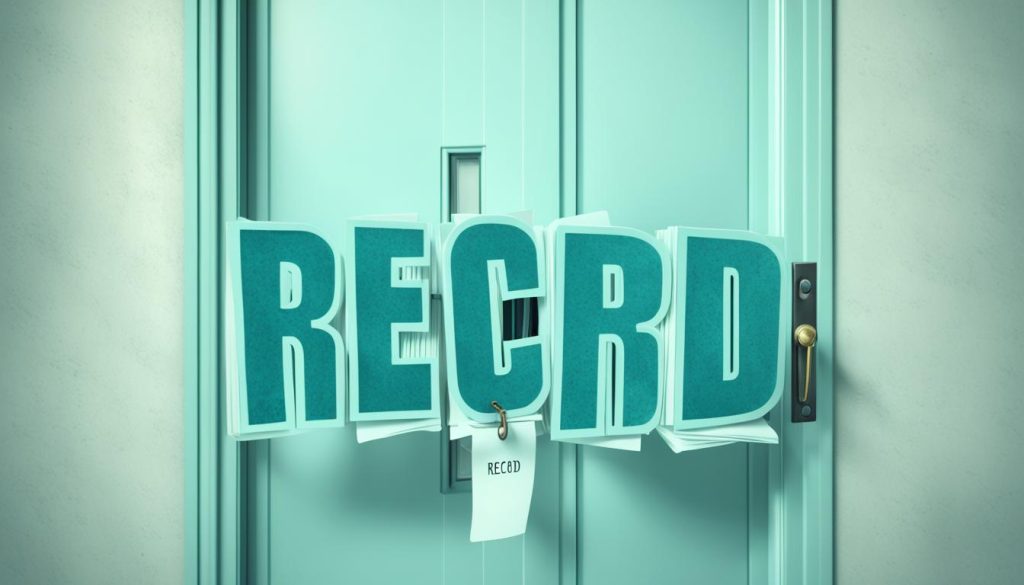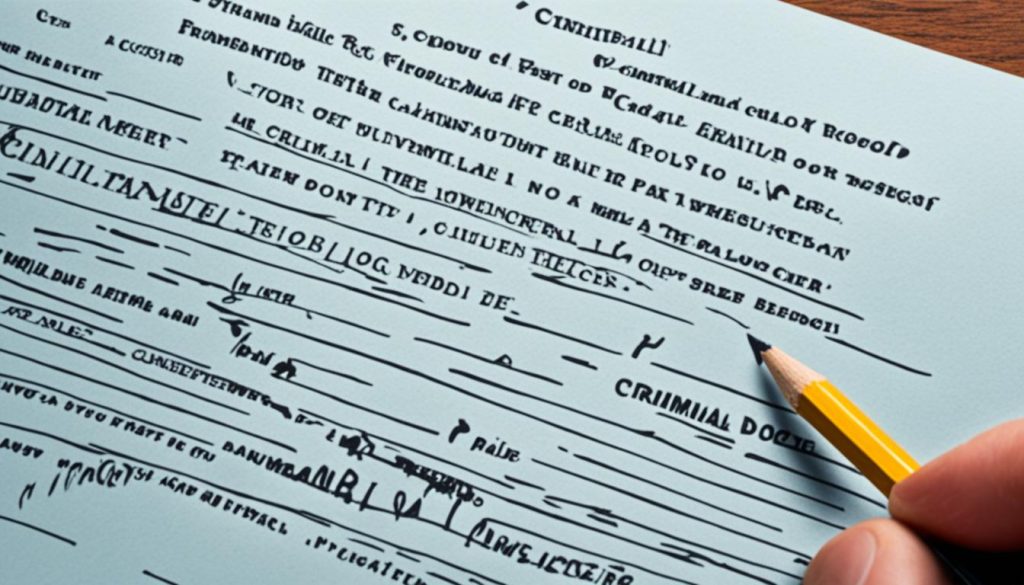A criminal record can haunt you for life, making it hard to get a job, go to school, or even rent a place. Even if you’re not convicted, an arrest and criminal case can still leave a mark1. But, you might be able to seal or expunge your records for a fresh start. Each state has its own rules for this, but it can give you a second chance if you meet the criteria.
“Expungement” and “record sealing” are often mixed up, but they’re not the same. Expungement wipes your criminal record from the public eye completely. Record sealing hides it, but law enforcement and some agencies can still see it2.
Key Takeaways
- Expungement and record sealing can help you move on from past criminal charges or arrests.
- The eligibility criteria and legal processes vary by state, so it’s important to understand the specific laws in your area.
- Seeking professional legal assistance can significantly improve your chances of successfully clearing your record.
- A clean record can open up new opportunities for employment, education, housing, and travel.
- Automatic expungement and “Clean Slate” laws are emerging, but unequal access to justice remains a challenge.
Understanding the Difference: Expungement vs. Record Sealing
When dealing with criminal records, people have two main choices: expungement and record sealing. Both aim to help individuals start fresh, but they differ in how much of the record is removed and who can see it.
What is Expungement?
Expungement wipes out a criminal record, making it as if the crime never happened3. In Texas, it’s called “expunction” and removes the criminal record completely3. This means the record is not seen by anyone doing background checks.
What is Record Sealing?
Record sealing hides criminal records from the public3. In Texas, it’s called “non-disclosure” and keeps the records but hides them from most people3. Even though the record is still there, it’s hard to find for most uses.
Expungement clears the record completely, while sealing keeps it but limits access3. Expungement is a deeper clean, wiping out the record fully. Sealing just makes it hard to find.
| Expungement | Record Sealing |
|---|---|
| Completely erases the criminal record | Restricts access to the criminal record |
| The record is no longer accessible to private parties | The record still exists, but is not readily available |
| Considered a more comprehensive option | Preserves the record, but limits accessibility |
It’s important to know the differences between expungement and sealing to make the right choice for clearing your criminal past34.
For details on who can apply and how to go about expungement and sealing in Texas and Florida, talk to a criminal defense lawyer34. They can offer tailored advice and help you through the legal steps.
expungement, sealing records, criminal record, legal process
Expungement and record sealing let people clear their past criminal records. This opens doors to new chances. It’s important to know how to clear or limit access to your criminal record.
Eligibility Criteria for Expungement
Expungements are usually for cases dismissed or with deferred disposition, not convictions5. Judges decide on expungements, while the President or state governors can pardon federal or state crimes5. Each state has its own rules for expungement, some for dismissed cases, others for minor crimes5.
To get an expungement, you need to wait a certain time after the case ended, have no new crimes, and not have serious felony convictions5. You must also finish any conditions set by the court5.
Eligibility Criteria for Record Sealing
Record sealing hides your criminal record from the public, unlike expungement which erases it. In Georgia, most misdemeanors can be sealed, but not serious felonies like armed robbery6. You can seal up to two misdemeanor convictions6.
Georgia also seals some felony convictions after certain steps through court6. This makes your criminal record hard to see in background checks, but courts can still look at it6. Some crimes like DUI or murder can’t be sealed6.
To seal your record in Georgia, your case must meet certain conditions, like being dismissed or having no new crimes7. Some cases like not being presented to a grand jury can also be sealed7.
Sealed records in Georgia don’t show up in background checks, but can be seen by the F.B.I. or other states for certain reasons7. Only criminal justice agencies and officials can see sealed records in Georgia for specific jobs or investigations7.

| Expungement | Record Sealing |
|---|---|
| Typically available for dismissed cases or those with deferred disposition, but rarely for convictions. | Limits public access to the criminal record, but does not erase it entirely. |
| Granted by judges, with the authority to grant pardons held by the President or state governors. | In Georgia, most misdemeanor convictions are eligible, with a maximum of two per individual. |
| State laws vary widely in eligibility criteria, with some allowing it only for pre-plea dismissals and others for certain post-conviction cases. | Serious felonies like armed robbery and aggravated stalking are not eligible for record sealing in Georgia. |
| Eligibility factors may include time passed, no additional criminal history, and completion of terms of disposition or sentencing. | Restricted records in Georgia are not displayed in background checks, but information on time-expired restrictions may still be available. |
The Expungement Process: Step-by-Step Guide
If you want to clear your criminal record, the expungement process can help. Start by filing a petition for expungement in the court where your case was first heard8. Remember, you need a separate petition for each criminal case you have8.
After filing your petition, a judge will check if you qualify for expungement8. Each court has its own rules for expungement, so make sure you know yours8.
If you get expungement, you must give copies of the order to law enforcement8. This makes sure your criminal record is wiped clean and private8.
The expungement process can take a few months because of objections, court reviews, and police checks8. Stay patient and keep going as you work towards a clean record8.

Expungement rules and eligibility differ by state9. Some states are stricter, while others offer more chances for expungement, even for some marijuana charges9. Getting legal help can make the expungement process easier in your state9.
Sealing Criminal Records: The Legal Procedure
The process of sealing a criminal record has several important steps. First, you need a Certificate of Eligibility. This proves you’re eligible for record sealing10. After getting the certificate, you can ask the court to seal your criminal history.
Obtaining a Certificate of Eligibility
Getting a Certificate of Eligibility is the first step. Your application is reviewed carefully to check if you qualify10. It usually takes about 12 weeks to process your application after it’s submitted10.
Petitioning the Court
With the Certificate of Eligibility, you can ask the court to seal your criminal record. This court order tells the state agency (like FDLE in Florida) to seal your criminal history record10. The court looks at your application and other documents to make sure you’re eligible for sealing.
The path to a clean slate can differ based on your situation and the state’s laws. It’s key to research the eligibility rules and follow the legal steps carefully for the best results.
Benefits of a Clear Record: New Opportunities Await
Clearing your criminal record through expungement or record sealing opens up new doors. With a clean slate, your job search gets a boost. Employers are less likely to overlook you because of a sealed or expunged record11.
Also, schools might welcome you more if you’ve had your record cleared. This removes the shame of a past crime11. Plus, you’ll find it easier to get a place to live and travel without your criminal history holding you back11.
Employment Prospects
Studies show that after clearing your record, you’re more likely to find a job and earn more. In Michigan, job chances went up by 6.5% and wages by 22% in the first year11. Also, less than 4% of people were arrested again within five years11. In California, those who got their records expunged saw their income go up by $6,190 a year. They also felt more confident about their job future11.
Educational Advancement
With a clean record, doors to education open wider. Schools might be more willing to accept you after expungement or record sealing. This is because the stigma of a past crime is lifted11.
Housing and Travel Freedom
Having a clear record means you can live and travel without limits. Landlords and border officials are less likely to say no because of your past11.

Clearing your record can change everything. It opens up a world of chances and gives you a second chance to succeed1213.
| Benefit | Impact |
|---|---|
| Employment Prospects | – 6.5% increase in employment probability11 – 22% rise in wages in the first year11 – 93% expressed confidence in future job prospects after expungement11 |
| Educational Advancement | – Increased acceptance by educational institutions11 – Removal of stigma associated with criminal past11 |
| Housing and Travel Freedom | – Reduced likelihood of denial by landlords and border authorities11 – Ability to pursue dreams without unnecessary limitations11 |
By taking steps to expunge or seal your record, you can unlock new chances. You can take back your right to a second chance1213.
Conclusion: Embracing a Second Chance
The journey of expungement and record sealing changes lives, giving people a second chance14. It clears or hides past criminal records, opening doors to a brighter future. This process shows our ability to change and come back stronger, letting us start fresh and build our dreams.
With15 most states making it easier to expunge and seal records, starting over is now within reach. If you want to clear a felony or seal a misdemeanor, knowing the rules is key14. Getting help from skilled lawyers can make a big difference, guiding you through the process for the best results.
Having a clean slate means you can take back your life and look forward to the future14. By clearing or sealing your record, you open doors to better jobs, education, and freedom to travel. It’s a path of strength, growth, and believing in second chances for everyone.
FAQ
What is the difference between expunging and sealing a criminal record?
Expunging a record means it’s deleted from the public record. Sealing a record keeps it hidden but it still technically exists. Expungement fully removes any trace of an arrest or charge.
What types of criminal cases are eligible for expungement?
You can get your record expunged if your case was dismissed or you completed a deferred disposition. Convictions usually don’t qualify. Each state has its own rules.
How do I get my criminal record expunged or sealed?
Start by filing a petition in the court where your case was heard. The judge checks if you qualify. If yes, you might need to share the expungement order with police.
How long does the process of expungement or record sealing take?
First, you apply for a Certificate of Eligibility. This usually takes about 12 weeks after you send in your application. The time can vary because of the detailed checks needed.
What are the benefits of having my criminal record expunged or sealed?
A clean record can help you in many areas like jobs, school, homes, and travel. It reduces the chance of being judged unfairly by employers and others.

